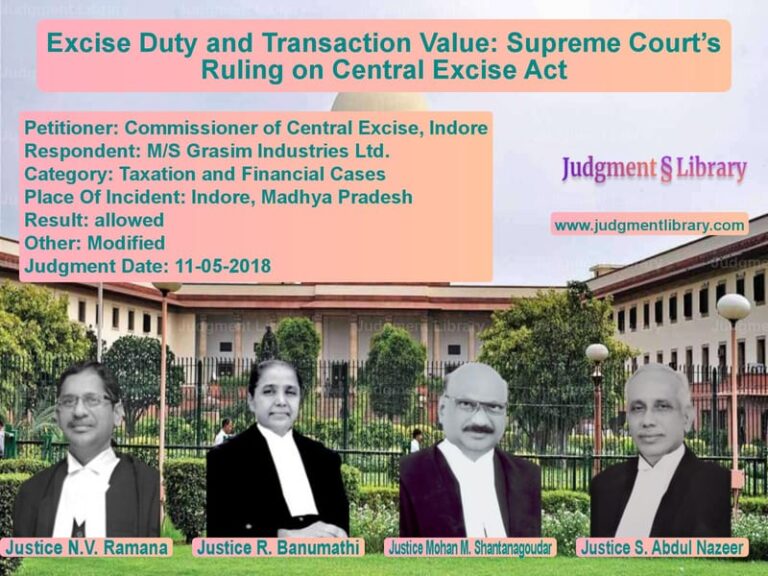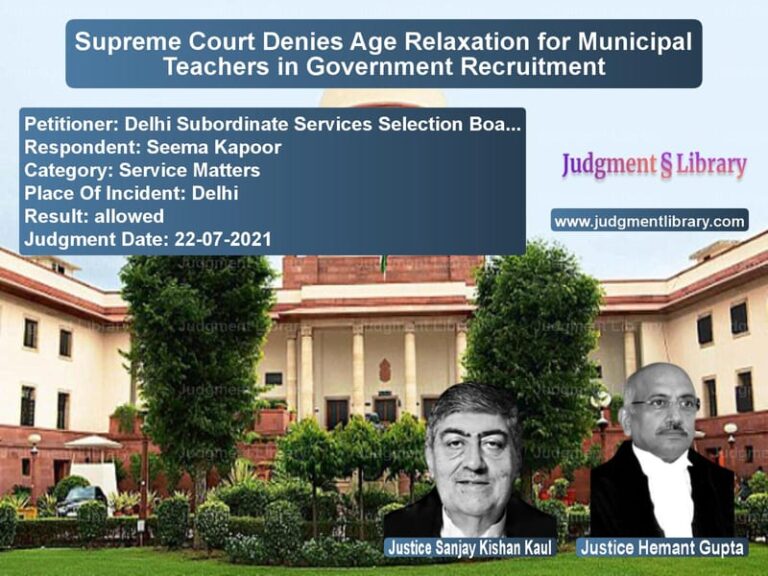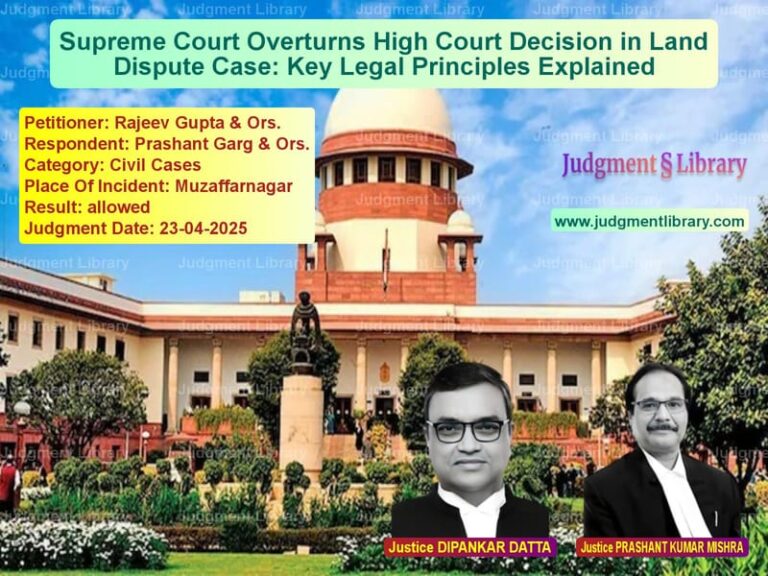Criminal Conviction Upheld: Jagdish vs. State of Haryana
The case of Jagdish vs. State of Haryana is a significant criminal appeal that revolved around a violent altercation leading to the death of an individual and injuries to several others. The Supreme Court of India upheld the conviction and sentence of the appellant, emphasizing the importance of eyewitness testimony and the role of evidence in establishing criminal liability.
The appellant, Jagdish, was convicted for offenses under Section 304 Part II and Section 323 of the Indian Penal Code (IPC) and sentenced to five years of rigorous imprisonment. The case highlights the complexities of criminal law, the evaluation of evidence, and the legal principles surrounding culpability in violent disputes.
Background of the Case
The case originated from a violent street fight between two sets of relatives, which resulted in the death of Zile Singh and injuries to Phoola Ram, Raj Kumar, and Krishan Pal. The altercation took place on June 15, 2001, in village Mowana, Haryana.
According to the prosecution, the incident unfolded when Phoola Ram was attacked by Nafe Singh with a gandasi (a sharp weapon). Hearing his cries for help, Zile Singh and his relatives arrived to intervene. Jagdish, armed with a lathi (wooden stick), along with other co-accused individuals, inflicted injuries on the victims, resulting in the eventual death of Zile Singh on June 21, 2001.
Key Legal Issues
- Whether the accused (Jagdish) was directly responsible for the death of Zile Singh.
- Whether the evidence presented by the prosecution, including eyewitness testimonies, was sufficient to sustain the conviction.
- The nature of the incident—whether it was a premeditated attack or a sudden fight.
- The validity of the trial court and high court’s concurrent findings.
Arguments by the Parties
Petitioner’s (Jagdish’s) Arguments
- There was no direct evidence linking him to the fatal injuries suffered by Zile Singh.
- The prosecution failed to prove his active participation in the attack.
- The courts wrongly relied on the testimonies of eyewitnesses without adequate corroborative evidence.
- Bloodstains were not found at the alleged crime scene, which cast doubt on the prosecution’s version of events.
- There was no medical evidence proving that the injuries inflicted by Jagdish were the direct cause of Zile Singh’s death.
Respondent’s (State of Haryana’s) Arguments
- The prosecution’s case was supported by three credible eyewitnesses who directly implicated Jagdish.
- Medical reports confirmed that the injuries suffered by Zile Singh were ante-mortem (inflicted before death) and were sufficient to cause death.
- The conviction was based on substantial evidence, including recovery of weapons and testimonies of injured witnesses.
- The appellant’s involvement in the attack was established beyond reasonable doubt.
Trial Court’s Decision
The trial court convicted Jagdish under:
- Section 304 Part II IPC – Culpable homicide not amounting to murder.
- Section 323 IPC – Voluntarily causing hurt.
Jagdish was sentenced to five years of rigorous imprisonment and a fine of Rs. 2000 under Section 304 Part II, and an additional one year for the offense under Section 323.
Other co-accused individuals were convicted of lesser offenses and sentenced accordingly.
High Court’s Ruling
Jagdish appealed his conviction before the Punjab and Haryana High Court. However, the High Court upheld the trial court’s findings, emphasizing:
- Eyewitness testimonies were consistent and reliable.
- The appellant’s role in the crime was clearly established.
- The injuries inflicted by the appellant were directly linked to the victim’s death.
- There was no reason to interfere with the trial court’s decision.
Supreme Court’s Judgment
The Supreme Court dismissed Jagdish’s appeal, affirming his conviction and sentence. The Court observed:
“A concurrent finding of two courts, which is based on appreciation of oral evidence on a question as to whether the appellant (accused) was present on the spot, whether he gave a blow to the deceased and, if so, how many, is binding on this Court.”
The Court reiterated the principle that appellate courts should not interfere with concurrent factual findings unless they are perverse or unreasonable.
Key Observations by the Court
- The prosecution proved beyond a reasonable doubt that Jagdish was present at the scene and participated in the attack.
- The evidence of the eyewitnesses (PW-2 Raj Kumar, PW-10 Kishanpal, and PW-12 Phoola Ram) was consistent and credible.
- Bloodstains not being found at the crime scene was not sufficient to negate the prosecution’s case.
- Jagdish’s active role in assaulting the deceased was established through direct testimony.
- There was no evidence to suggest the eyewitnesses were biased against Jagdish.
Final Judgment
The Supreme Court upheld the High Court’s ruling and dismissed the appeal. It further directed:
“The bail granted to the appellant by this Court is cancelled, and the appellant is directed to surrender before the Trial Court so as to enable him to undergo the remaining period of his sentence.”
Conclusion and Legal Impact
The ruling reaffirmed several key legal principles:
- Eyewitness testimony plays a crucial role in establishing criminal liability, provided it is consistent and credible.
- Concurrent findings of the trial and high courts are binding unless they are arbitrary or unreasonable.
- Absence of forensic evidence (such as bloodstains) does not automatically weaken the prosecution’s case if direct evidence is strong.
- Appellate courts should not interfere with factual determinations unless there is a clear miscarriage of justice.
The Supreme Court’s judgment serves as a critical precedent in cases involving violent altercations and homicide, reaffirming the importance of eyewitness testimony and the principles governing criminal appeals.
Judgment delivered by: Abhay Manohar Sapre, Ashok Bhushan
Judgment Date: June 29, 2016
The ruling highlights the significance of thorough judicial scrutiny of evidence and ensures that convictions are upheld when backed by solid witness accounts and legal principles.
Don’t miss out on the full details! Download the complete judgment in PDF format below and gain valuable insights instantly!
Download Judgment: Jagdish vs State of Haryana Supreme Court of India Judgment Dated 29-06-2016-1741872429736.pdf
Direct Downlaod Judgment: Direct downlaod this Judgment
See all petitions in Attempt to Murder Cases
See all petitions in Bail and Anticipatory Bail
See all petitions in Custodial Deaths and Police Misconduct
See all petitions in Judgment by Abhay Manohar Sapre
See all petitions in Judgment by Ashok Bhushan
See all petitions in dismissed
See all petitions in supreme court of India judgments June 2016
See all petitions in 2016 judgments
See all posts in Criminal Cases Category
See all allowed petitions in Criminal Cases Category
See all Dismissed petitions in Criminal Cases Category
See all partially allowed petitions in Criminal Cases Category







